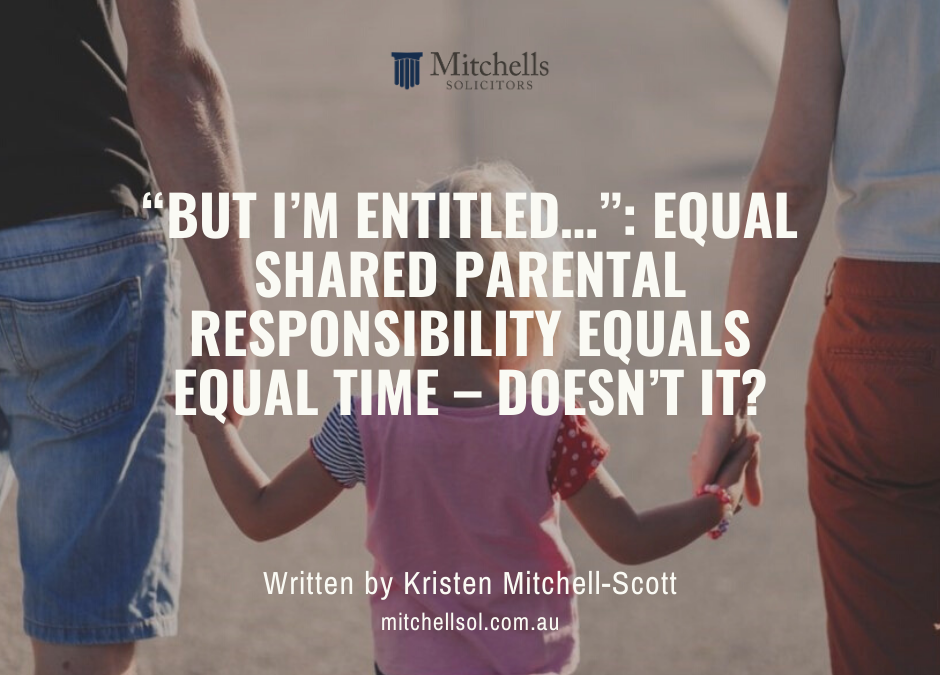“But I’m Entitled…”: Equal shared parental responsibility equals Equal Time – Doesn’t it?
Written By Kristen Mitchell-Scott
We all know that a separation between parties is fraught with emotion, particularly so when children are involved. The next natural step for most people is to want to sort out their parenting arrangements.
Regardless of the circumstances surrounding how the separation occurred, you and your ex-partner are likely to start out with the understanding that you will have shared care of your children. This is the ideal situation. However, reality is often different to what we anticipate will occur and, unfortunately, equal time is not what you may end up with.
Pursuant to s61C Family Law Act 1975 (Cth), where no formal parenting agreement has been reached, it is presumed parties will continue to have equal shared parental responsibility. Parental responsibility is defined in s 61B Family Law Act 1975 (Cth) as “all the duties, powers, responsibilities, and authority which by law, parents have in relation to children”. This extends to decisions about what are called major long-term issues and, as defined in s 4, these include decisions regarding the children’s education, health, name, religion and, what is often most important, any changes to the child’s living arrangements that make it significantly more difficult for the child to spend time with one parent.
Accordingly, people often believe that, if they have equal shared parental responsibility, then they’re entitled to equal time. This is not always going to be the case.
If you and your ex-partner commence negotiations to determine your spend time arrangements for your children, you must ensure that the best interest of the children are the paramount consideration for you both. This is exactly the standard that the Court applies when making parenting orders, as per s 60CA Family Law Act 1975 (Cth).
If disagreement arises, you and your ex-partner are separately encouraged to obtain independent legal advice with a view to engaging in mediation, or another form of dispute resolution. This is to prevent rushing off to Court and to preserve your relationship with your ex-partner, in order for co-parenting to be easier. However, for the purposes of this Article, I will discuss the presumptions that the Court applies when required to make parenting orders by warring parents.
Pursuant to s 61DA Family Law Act 1975 (Cth), when making a parenting order, the Court applies the presumption of equal shared parental responsibility, where this is in the best interests of the child. The presumption will not apply if the Court believes, on reasonable grounds, that a parent or an associate of the parent has engaged in child abuse or family violence. Should the presumption be applied, we then move to consider whether the parents would be able to have equal time with the child.
Importantly, there is no presumption for equal time. Provided the Court has ordered equal shared parental responsibility, the Court must then consider whether equal time with the child would be in the child’s best interests and whether it would be reasonably practicable. If the answer to either of these questions is no, then the Court will then consider whether substantial and significant time with the child is in the child’s best interests and reasonably practicable.
Substantial and significant time is defined in s 65DAA(3) Family Law Act 1975 (Cth) as time which includes weekdays, weekends and holidays, which allow the parent’s involvement in the child’s daily routine, significant occasions and events for the child and for the parent. In order for the Court to consider whether such arrangements would be in the best interests of the child, they must go back to the requirements under s 60CC Family Law Act 1975 (Cth), the primary considerations being the benefit of the child having a meaningful relationship with their parents, balanced against the need to protect the child from any harm from being subjected to or exposed to family violence, with the latter outweighing the former.
Bottom line – equal shared parental responsibility does not automatically equal equal time. It is important to refocus yourself as to what is in the child’s best interests and work back from there.

If you would like advice and assistance with your parenting matter, please contact Kristen Mitchell-Scott of Mitchells Solicitors on (07) 3373 3633 or via email at kmitchellscott@mitchellsol.com.au .
Kristen Mitchell-Scott is a Solicitor and part of the Family Law Team at Mitchells Solicitors.

